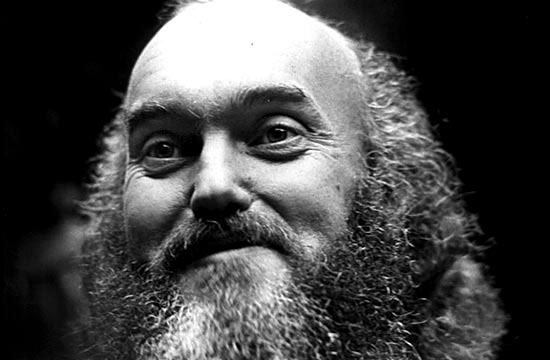The spiritual teacher Ram Dass often examines human suffering in his many lectures and writings, since it concerns us all. As the First Noble Truth of Buddhism says, “life is dukkha” (a Pali term commonly translated as “suffering” or “unsatisfactoriness”, although its meaning is quite varied, since impermanence is also dukkha). It may seem like a pessimistic axiom, as it proposes that an essential characteristic of human existence is pain and dissatisfaction. Yet if you consider the manifold ways in which you as an individual have suffered and have been left unsatisfied – as well as the ways in which people all over the globe are afflicted with pain – then this ‘truth’ does appear self-evident. As the comedian Jerry Seinfeld puts it:
You suffer in all things — work, relationships, whatever else you do. Unless you’re eating ice cream, you’re suffering.
However, a common misconception of the First Noble Truth is that all of life is suffering, yet this isn’t true, as happiness obviously exists as well (not just when you’re eating ice cream, but in an infinite variety of other ways too). But the inevitability and life-long persistence of suffering does beg the question: how, as human beings destined for suffering, can we truly participate in a joyful and flourishing life?
Ram Dass has tackled this seemingly intractable problem and offers the perspective that suffering is a sort of paradox. As he claims in one of his articles: “The horrible beauty is that suffering is grace and suffering stinks.” There is this interesting dichotomy with suffering whereby it is something we all want to avoid and alleviate, yet we find that it is suffering which moulds us, strengthens us and elevates us to a degree that would perhaps not have been attainable were it not for us bearing the struggle and riding the storm.
This quality of suffering has been elucidated by a number of great thinkers. The famous saying “That which does not kill us, makes us stronger” comes from the German philosopher Friedrich Nietzsche. And as Ram Dass urges us to do, when you look back on your life, you will see how much growth came from your suffering. Furthermore, the psychiatrist Russell Razzaque argues in his book Breaking Down is Waking Up that the experience of mental illness can be highly meaningful and transformative for many patients. One person, for instance, got in touch with Razzaque to say:
I always believed that despite all the pain and hardship, there was something of real value in it.
As people break down, tumbling downwards to a personal hell and the worst pain they’ve ever experienced, there can also be the experience of ‘waking up’. This relates to the paradox of suffering. There is a view among some psychiatrists, such as Razzaque and James Davies (author of Cracked: Why Psychiatry is Doing More Harm Than Good) that mental health issues are a signal for changes that need to occur in order to achieve psychological health. Depression can present itself as a challenge to an individual’s sense of who they are and the meaning and purpose of their life. Indeed, Davies views many instances of poor mental health as a form of personal, existential and philosophical crisis.
The writer Tom Ruggiero has examined the relationship between depression and philosophy, concluding that:
A person who is “depressed” may thus, on this view, see things others don’t see, have keen insight into the waywardness of modern culture, have a refined sense of the good and the beautiful. Drugging a person would therefore dim his vision, desensitize his perception, kill the penchant to search for meanings.
Of course, people do not voluntarily enter a state of mental illness, and it would be unwise to say that all cases of depression, say, are insightful, realistic and warrant only deep existential exploration. (The idea that depression involves an accurate appraisal of reality is known as ‘depressive realism’, although the clinical evidence to substantiate this hypothesis is inconclusive.) Indeed, there are clearly cases of mental illness which have nothing to do with philosophy, one’s circumstances or something ‘missing’ that needs to be addressed; but instead inflict the sufferer for other reasons (e.g. genetic predisposition, child abuse, so forth and so on).
Moreover, mental illness can be so severe that immediate hospitalisation or pharmaceutical intervention is necessary (i.e. with those who self-harm or who are suicidal). Meanwhile, therapeutic intervention can be helpful to both the person who has been inexplicably burdened with depression, as well as the person who becomes depressed due to the ills of modernity or a confrontation with the apparent futility and meaninglessness of human existence.
In any case, whenever you suffer, it can be rejuvenating to remember the wisdom of Ram Dass who stresses that of course suffering stinks – it is constant, nightmarishly varied in both physical and mental manifestations and can be intense to the point of feeling unbearable – yet it is also fertile ground for self-development. As psychiatrist Viktor Frankl wrote in his book Man’s Search for Meaning, in which he recounts the lessons gained from being confined to the Nazi concentration camps:
The way in which a man accepts his fate and all the suffering it entails, the way in which he takes up his cross, gives him ample opportunity – even under the most difficult circumstances to add a deeper meaning to his life.
The “grace” of suffering that Ram Dass talks about pertains to exactly this mode of being, this way of responding to suffering. By accepting suffering, we can transcend it. And by nodding to pain and saying “I fully recognise this and don’t reject it”, we lessen the burden of that pain. This attitude of acceptance, which forms the basis of acceptance and commitment therapy (ACT), can be a wellspring for both meaning and healing.
